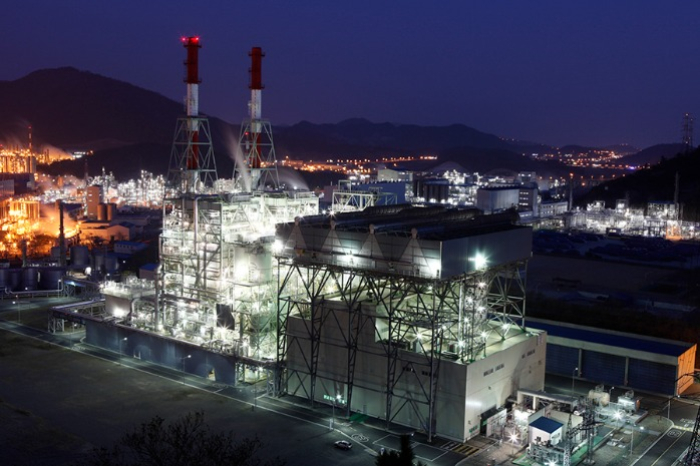Petrochemicals
Kumho Petrochemical accelerates CCUS push with CO2 capture plant
The company plans to complete in 2025 the construction of a plant that captures and liquifies 69,000 tons of CO2 per annum
By Dec 03, 2023 (Gmt+09:00)
3
Min read
Most Read
LG Chem to sell water filter business to Glenwood PE for $692 million


Kyobo Life poised to buy Japan’s SBI Group-owned savings bank


KT&G eyes overseas M&A after rejecting activist fund's offer


StockX in merger talks with Naver’s online reseller Kream


Mirae Asset to be named Korea Post’s core real estate fund operator



Kumho Petrochemical Co., South Korean petrochemical major, is accelerating its inroads into the carbon capture, utilization and storage (CCUS) market by adding a plant to capture and liquify 69,000 tons of carbon dioxide every year.
The company on Friday broke ground on a plant, where it will capture and liquify CO2, at its second energy production campus in Yeosu, a port city on Korea’s southeast coast.
The plant is expected to capture 69,000 tons of CO2 from emissions generated from Kumho Petrochemical’s cogeneration power plant every year and liquify the captured CO2 onsite to reuse it.
Kumho Petrochemical’s liquid CO2 joint venture set up with Hankook Special Gases Co. in September will turn captured CO2 into liquid CO2, carbon dioxide gas highly compressed and cooled to a liquid form that can be used in a wide range of industries from welding to food services and entertainment.
The plant is expected to play a key role in accelerating the expansion of the company’s new growth driver, CCUS, as part of its business diversification efforts.
“We will achieve carbon neutrality with the development of technologies that can transform captured CO2 into high-value added carbon compounds,” said Baek Jong-hoon, the president and chief executive of Kumho Petrochemical. “At the same time, we will seek to discover opportunities for new growth drivers.”
The annual capture of 69,000 tons of CO2 is equivalent to the effect of planting 27,000 trees every year, the company claimed.
GROWING CCUS MARKET
Once the plant is completed in 2025, it will be Kumho Petrochemical’s first CCUS facility.

Demand for the CCUS technology, aimed to capture CO2 generally from power generation and industrial facilities and store and reuse the captured CO2 in a range of applications, is growing amid an increasing call for decarbonization worldwide.
CCUS can be retrofitted to existing power and industrial plants and enables the least expensive low-carbon hydrogen production.
The CCUS industry is forecast to grow at an 18% compound annual growth rate to capture 420 million metric tons of CO2 a year by 2035, mainly driven by the strong global policy to support decarbonization, according to research company BloombergNEF (BNEF).
BNEF reported that the worldwide CCUS industry captured over 140 million metric tons per annum from 2022.
The major sectors expected to drive CCUS expansion include ammonia or hydrogen production and power generation, which will together account for 33% of announced carbon capture capacity.
BUSINESS RESTRUCTURING
Kumho Petrochemical’s foray into the CCUS market is part of its business reorganization efforts to tackle the slowdown in its mainstay petrochemical business, which makes synthetic rubber, synthetic resin and phenolic derivatives.
The company also said in its New Year’s plan earlier this year that it would beef up investment to diversify and improve the quality of its carbon nanotube (CNT) products in line with the growing eco-friendly vehicle market.
In late October, The Korea Economic Daily exclusively reported that Kumho was in talks with POSCO International Corp. to set up a joint venture to produce CNTs, a next-generation battery material.
Hyundai Heavy Industries Power Systems Co. will build Kumho’s CO2 capture and liquefaction plant on an engineering, procurement and construction (EPC) contract.
Write to Hyung-Kyu Kim at khk@hankyung.com
Sookyung Seo edited this article.
More to Read
-
 Chemical IndustryKumho Petrochem, POSCO look to carbon nanotube JV, share swap
Chemical IndustryKumho Petrochem, POSCO look to carbon nanotube JV, share swapOct 27, 2023 (Gmt+09:00)
2 Min read -
 Corporate restructuringLG to slim down petrochem as Chinese rivals creep up
Corporate restructuringLG to slim down petrochem as Chinese rivals creep upJun 19, 2023 (Gmt+09:00)
2 Min read -
 PetrochemicalsKumho Petrochemical to recycle plastic waste with French partner
PetrochemicalsKumho Petrochemical to recycle plastic waste with French partnerNov 22, 2022 (Gmt+09:00)
1 Min read -
 PetrochemicalsContrarian leader's bets drive Kumho Petrochem's record profits
PetrochemicalsContrarian leader's bets drive Kumho Petrochem's record profitsDec 16, 2021 (Gmt+09:00)
2 Min read
Comment 0
LOG IN


